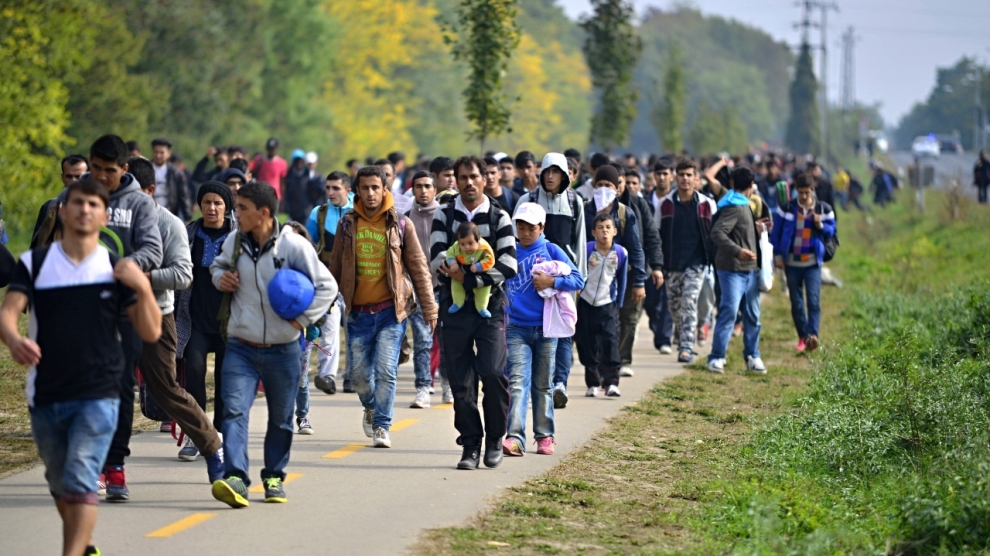Integration is key, says Matthias Ruete, the European Commission’s chief of migration and home affairs. He spoke to Nikodem Chinowski about the impact of refugees and immigration on the economies and labour markets in the CEE region and the actions that the European Commission is planning to undertake on refugee camps in Serbia and Hungary.
How does the European Commission see the impact of immigrants on labour markets in the EU and Central and Eastern Europe?
Immigration plays a significant role in addressing the labour and skills shortages experienced in certain sectors; shortages which are expected to increase in coming years. This also plays a key role in tackling current and future demographic challenges within the EU, and labour migration will certainly contribute to the economic development of the EU in the long term.
Several studies indicate that labour migration does make sense economically. In the long term, both high and low-skilled workers who migrate bring benefits to their new home countries, by increasing income per capita as well as living standards. High-skilled migrants bring diverse talent and expertise, while low-skilled migrants fill essential gaps where the EU workforce is in short supply. The population broadly shares these gains; therefore, it may be well worth shouldering the short-term costs to help integrate these new workers.
In this respect, integration is key. For refugees, labour market integration in the EU has improved significantly over time. Refugees have skills that their host countries can build on, with at least one in five refugees having benefited from tertiary education. If the reception of refugees and their family members is combined with effective measures to ensure their integration, the EU can capitalise on their potential and on their strong motivation to become active members of European society. The commission is working with member states to forge a coherent and comprehensive way of both reaping the benefits and facing the challenges of migration in the long term.
When it comes to the Central and Eastern European countries, the number of migrants in relation to the population is relatively low. It is therefore difficult to assess the economic impact migration has in these countries.
Is it not true that these ‘talents from third countries’ prefer to live in Germany or France rather than in the CEE region?
At country-specific level, the impact depends on the number of migrants and refugees and how they are integrated into the labour market. Labour market integration is crucial to ensure that migrants can positively contribute to the economy. There is a need to reinforce specific measures to support the integration of vulnerable migrants such as refugees but also family migrants, in particular women, who have large inactivity rates. Stepping up efforts to better integrate migrants into the EU labour market must be seen as an investment into the future for our economy and society.
Does the European Commission have data on job-profiles of immigrants? Can we assess which sectors of the labour market affect most immigrants?
At present, there is no EU-wide comprehensive data on job profiles of newly arrived migrants. Data is not collected systematically based on those sectors where migrants are employed on an EU level. We do however have information on employment rates and educational levels, and understand that non-EU nationals may need further education and training to access the labour market. In this respect, integration will be key to making migration an opportunity for everyone.
What is the European Commission’s plan to help people in refugee camps in Serbia, Hungary, and the Balkans?
We, the commission, and the EU’s agencies, have always stood by our member states and candidate countries when it comes to addressing the challenge of migration. Since May 2015, Serbia and other countries in the Western Balkans have been facing an unprecedented refugee crisis. In 2015 and in the first quarter of 2016, more than 920,000 refugees and migrants – primarily from Syria, Afghanistan, and Iraq – passed through Serbia on their way to Hungary and Croatia. We know that Serbia and other countries in the region have made a lot of efforts to deal with this unprecedented phenomenon.

What are your views on the prospects for the southern Balkans regarding the next wave of immigrants? Should we expect another wave? What preventative measures has the commission taken?
If the situation in countries of origin and transit of irregular immigration towards the EU, such as Syria and Libya, remain unresolved, people will continue to travel to Europe to seek protection. What is worth noting is that thanks to our cooperation with Turkey, arrivals to Greece have dropped by 97 per cent since April 2016. Compared with two years ago the difference is like night and day. Not only has our cooperation with Turkey, and the Turkish Coast Guard, contributed to substantially reducing irregular arrivals to the Greek islands, it has also contributed to preventing loss of life in the Aegean Sea by stepping up the fight against migrant smuggling. We are also seeing a decrease in arrivals to Italy. In July the number decreased by 50 per cent compared to June.
Despite recent positive trends, we need to remain vigilant and we are ready to face any future changes in migratory flows. We are continuing our work to better manage migration and strengthen our borders. Although it is difficult to predict with any certainty the changes and evolution of migratory flows at our external borders, we believe that all the measures we have taken in the past year should enable us to keep the situation on the eastern Mediterranean and western Balkan routes under control. We are in a better position now to react promptly and efficiently should the situation change.
Preventing onward secondary movements along the Western Balkans route is a specific priority for the EU and its members. The Commission, in cooperation with member states, third countries along the western Balkans and the European Border and Coast Guard Agency (Frontex), have set up a platform for regular exchange of information, among the countries concerned, which allows us to continuously monitor the situation.
The commission also supports capacity building in the field of border and migration management, including operational cooperation among the border guard authorities of member states and western Balkan countries. We have for example provided financial support for the deployment of border guard officers from EU member states to the borders of Macedonia and Serbia.
How will the waves of immigrants affect the EU’s economies, specifically in CEE?
In the short term, transit and host countries will face costs arising from the need to provide food, shelter and first aid. In the medium term, host countries need to deal with the processing of asylum applications and the costs of social and economic integration. The long-term impact might very likely be positive for the European economy if members have efficient integration policies in place. Non-EU nationals can play a vital role in tackling Europe’s alarming demographic trends, improving the ratio of active workers to non-active persons, such as pensioners, whilst also contributing to innovation, entrepreneurship, and GDP growth. In respect of the labour market, migrants can fill important niches both in fast-growing and declining sectors of the economy and contribute to labour-market flexibility.
Population projections by Eurostat show that, without migration, the EU’s working-age population will decline by 17.5 million in the next decade (2015-2025) and by nearly 30 million by 2030. Moreover, skills shortages are already emerging in some sectors. Attracting talent from third countries and ensuring that those who are already in the EU are fully integrated will not solve demographic and skills issues. However, it will become one of the ways we can ensure the growth and competitiveness of the EU economy and enhance the sustainability of our welfare system.
How would you describe the role of Frontex, headquartered in Warsaw, Poland?
With Frontex we now have the possibility to deploy border guards from member states to neighbouring third countries to support border control along common borders. We have already negotiated agreements with Serbia, and will start negotiations with Macedonia in September and plan negotiations with Albania, Montenegro and Bosnia and Herzegovina in the future.
Is there a risk that the dispute over the relocation of refugees between countries can move into economics?
The obligations of member states when it comes to the relocation of applicants for international protection, from Italy and Greece, is an essential element of our comprehensive response to the current migratory situation in the EU. All members must apply the principle of solidarity and assume their fair share of responsibility. This implies that all members stick to their commitments and show solidarity with those under pressure. After repeated talks with the Czech Republic, Hungary, and Poland to start relocating, the commission decided to launch infringement proceedings against these countries, which are in breach of their obligations. The commission still hopes, however, that they will reconsider their position and contribute to the implementation of the relocation scheme fairly and proportionally so that the commission can halt the infringement proceedings.
Can you achieve that goal soon?
Yes. The pace of relocation has been continuously improving, with most other member states now pledging and relocating on a monthly basis both from Greece and Italy, we believe that it is indeed possible to achieve this goal. The main goal of this emergency scheme is to relocate all eligible applicants present in Greece and Italy in the coming months.

